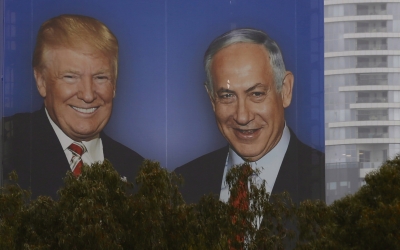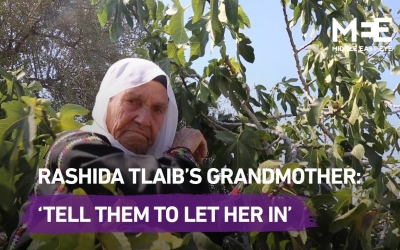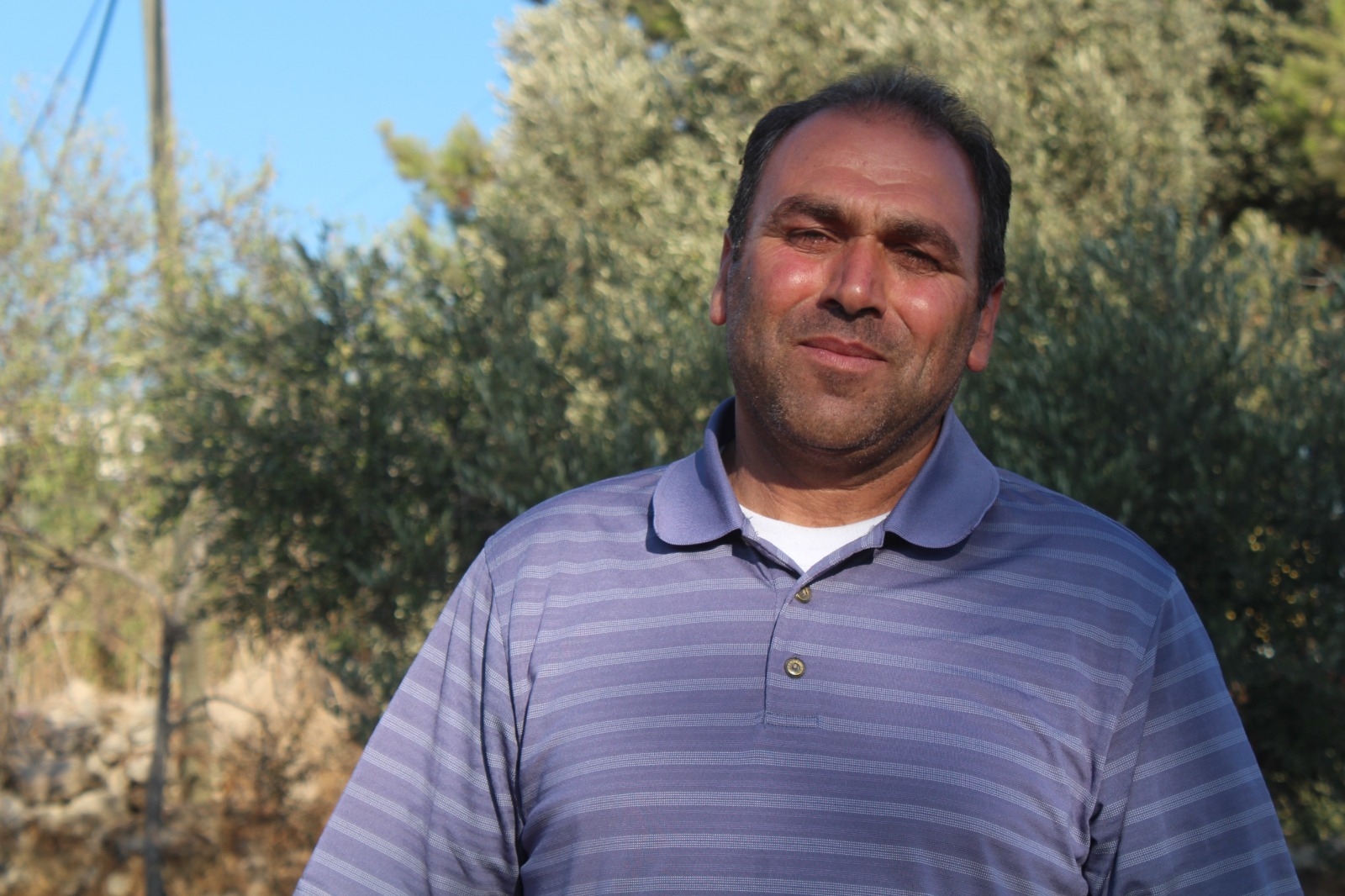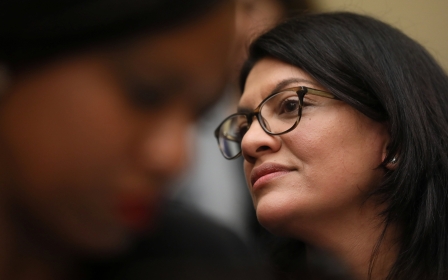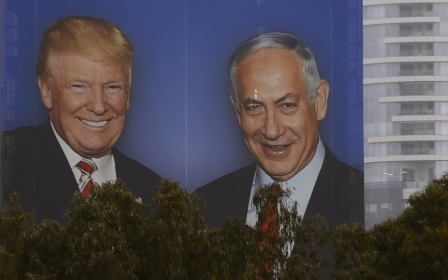Rashida Tlaib's family disappointed but not surprised by Israeli ban
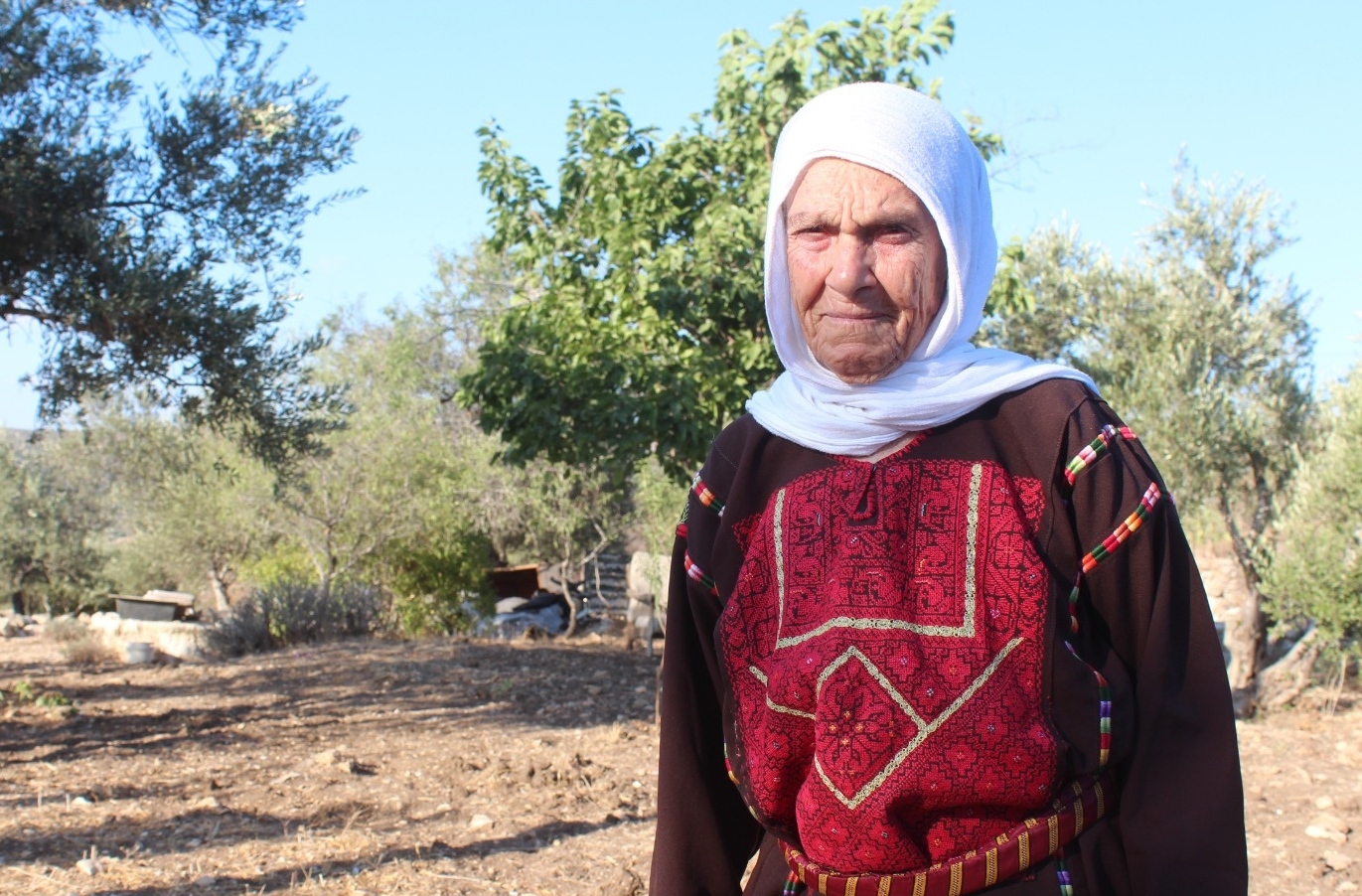
In the yard of her home in the central occupied West Bank, built in 1976, 85-year-old Muftiya sat wearing a traditional embroidered Palestinian thobe, drinking coffee with her son Bassam and discussing plans for a much-awaited visit by her granddaughter.
They pondered what food to cook, whether to feed her seasonal figs and green grapes, and how they would decorate and prepare the house to receive extended family for the occasion.
Flags, lights and other decorations had been brought to the home, and several statements had been prepared to be read for the occasion.
"I'm going to prepare all the Palestinian food that her heart pleases and we will pick figs off the trees together," Muftiya told Middle East Eye earlier this week.
On Thursday afternoon, the Israeli Ministry of Foreign Affairs announced that Muftiya's granddaughter, US representative Rashida Tlaib, would be barred entry into the occupied Palestinian territory.
Along with fellow congresswoman Ilhan Omar, Tlaib was planning to participate in a visit to the West Bank and East Jerusalem that was billed as an alternative to the pro-Israel trips organised and sponsored by the pro-Israel lobby group AIPAC for freshman members of Congress.
The US delegation was expected to land on Friday 16 August, and Tlaib, a Detroit native born to Palestinian immigrant parents, had allocated several days of her trip to spend with her extended family, away from work and media.
Tlaib shared a photograph of her grandmother on Twitter a few hours after Israel announced its decision to bar her entry. "This woman right here is my sity [grandmother]. She deserves to live in peace & with human dignity. I am who I am because of her," she tweeted.
"The decision by Israel to bar her granddaughter, a US Congresswoman, is a sign of weakness b/c the truth of what is happening to Palestinians is frightening."
In response to an international outcry, Israeli Prime Minister Benjamin Netanyahu said that Israel might allow Tlaib to enter if she submitted a request to visit her family on humanitarian grounds.
Tlaib then submitted a request and the Israeli Ministry of Interior said she would be allowed to visit her family on a strictly personal trip - even as the ban for the overall visit of the two lawmakers remained in place.
But on Friday, Tlaib tweeted saying that she had decided not to make the visit.
"Silencing me and treating me like a criminal is not what [my grandmother] wants for me. It would kill a piece of me," she wrote.
"I have decided that visiting my grandmother under these oppressive conditions stands against everything I believe in - fighting against racism, oppression and injustice."
Family members who have been looking forward to her visit told Middle East Eye that they were disappointed but not surprised by the ban.
'So proud of her'
The modest home of Tlaib's grandfather, Issa Abdullah, lies west of Ramallah city. The one-story house is nestled between two Israeli military bases at an intersection between adjacent Palestinian villages Beit Ur al-Fawqa and Beit Ur al-Tahta.
About 100 metres east of the house sits an Israeli military site that has been in place since 2011. Israeli soldiers are positioned behind cement blocks with their weapons pointed at passersby, and about 15 Israeli surveillance cameras are peppered across the area.
To the north lies Road 443, reserved exclusively for Israeli settlers' use, which was built on some of the family's land. Finally, about 500 metres west, there lies another Israeli military site in place since 1988.
Bassam, 53, is one of Rashida's eight uncles. He told MEE that Israeli soldiers monitor all of the family's movements in the area, restrict their access to the main road directly in front of their home, and regularly raid the house. The last time a raid took place was when a large group of journalists gathered to cover Rashida's electoral victory in November.
Despite such limitations, the family had been preparing for Rashida’s visit since July.
"We're ready to receive Rashida and her colleagues, but we are worried that the Israeli occupation will prevent her from entering," Bassam told MEE before Israel officially announced it would bar her entry.
Rashida spent most of her life in the US, with annual summer visits to Palestine.
It was in her grandparents' home that Rashida's 1997 wedding celebrations began, and to which she was now due to return as a political figure - the first Palestinian-American woman to be elected to the United States Congress.
Rashida's grandmother Muftiya, who has lost most of her hearing with age, said that what made her happiest was the prospect that Rashida would be able to pick figs directly off the trees in her grandfather's yard.
"I am so proud of her. I prepared the arrangements for her high school graduation celebration, then her undergraduate, and today we will celebrate her election to Congress," Muftiya said, when the arrival of her granddaughter still appeared likely.
Reached on Thursday afternoon, Tlaib's uncle Bassam told MEE that the family had not told Muftiya yet about the ban issued against Tlaib, fearing it would affect the elderly woman’s health.
"We aren't surprised by the decision," he said. "We were expecting that the occupation would forbid her entry to Palestine at any moment."
Against the odds
Despite making it to Congress against all odds, many of her relatives have wondered about the leeway Tlaib has to make real changes under US President Donald Trump, seen by many Palestinians as one of the most anti-Palestinian heads of states in US history.
Bassam said she is well aware of the suffering faced by the Palestinian people, an image she aims to reflect to other Congress members and to the rest of the world.
"We are proud of Rashida, as the first Arab, Muslim, Palestinian woman to reach Congress. As her family, and the families of the village, we are planning on holding a ceremony in her honour," Bassam continued.
Growing up, Rashida's grandfather Issa envisioned her as the family's future lawyer, Bassam recalled.
"Rashida was very ambitious and had leadership skills. We knew she'd be successful, but we never imagined she'd end up in politics.
"Rashida's presence in one of the most anti-Palestinian US governments has given us hope that she may be able to [apply] pressure in favour of Palestinian rights, and to end such policies," he added.
"If that is too ambitious, then at least we as Palestinians will have an oppositional voice in the US Congress."
This article is available in French on Middle East Eye French edition.
Middle East Eye propose une couverture et une analyse indépendantes et incomparables du Moyen-Orient, de l’Afrique du Nord et d’autres régions du monde. Pour en savoir plus sur la reprise de ce contenu et les frais qui s’appliquent, veuillez remplir ce formulaire [en anglais]. Pour en savoir plus sur MEE, cliquez ici [en anglais].


